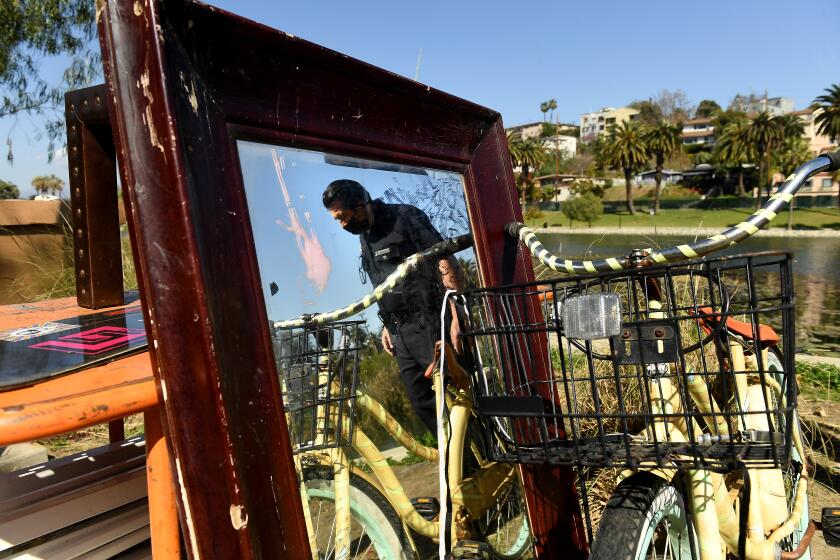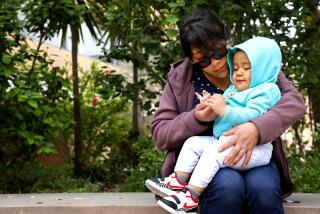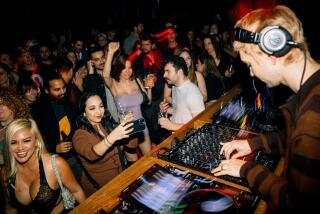A young talent killed, a neighborhood fed up, and a critical moment in L.A.’s homelessness crisis
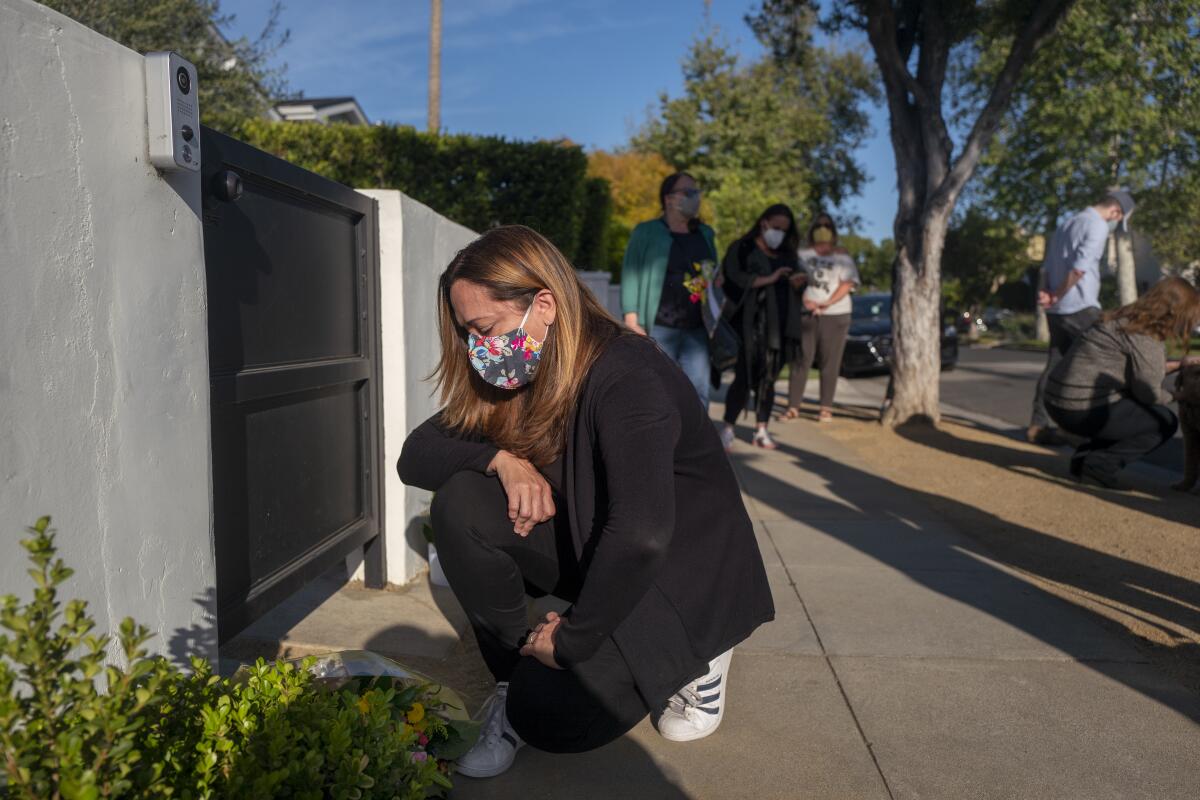
- Share via
During a somber memorial in a Beverly Hills park Friday night, Albert Donnay beamed through tears as friends, fellow musicians and co-workers remembered his 31-year-old son, Gabriel “Gabe” Donnay.
Gabe was whip smart, incredibly talented and deeply compassionate, they said — including toward those with mental health issues, which he struggled with himself.
“He was exactly the type of person that L.A. needs,” said Bo Jacobson, a close friend.
“He loved L.A. so much and he loved so many people,” said his girlfriend, Liza Herzog.
The memorial was several nights after Gabriel Donnay’s killing in his own backyard in nearby Beverly Grove, where he was stabbed by an intruder who police said was living out of his car and who neighbors had reported was hopping fences before the attack. Now, with the help of a loudspeaker balanced atop a park grill, Albert Donnay begged those gathered around him to use his son’s memory to force change.
“Gabe would challenge us to find some way to move the world ahead from this,” Donnay said. “We are not the first or the last to lose our child to senseless violence, but it won’t stop unless we figure out a way to do it.”
On Saturday night, another crowd — some of Gabriel Donnay’s friends again, but also dozens of neighbors — gathered in front of the home where the attack occurred, in the 6600 block of Maryland Drive. They lighted candles and placed flowers near the front gate, then listened as Craig Brill, 54, who has lived in the neighborhood since 1996 and had interacted with the suspect before the attack, spoke up about the neighborhood’s fears and frustrations.
Two men are found dead hours apart in the Beverly Grove area on Monday. Police are investigating the connection.
Brill said homeless encampments had grown out of control in the area during the pandemic, with people suffering from mental illness living in squalor and regularly burglarizing nearby properties. This new status quo, he said, was inhumane to the homeless people and unfair to the neighbors — and now, in the eyes of many neighbors, had led to a young man’s killing.
“It’s a tragedy that we lost Gabriel, and it’s also a tragedy that a man with mental illness was allowed to roam our streets as a danger to himself and to the community,” Brill said. “I hope as we all gather and we get to know each other better as neighbors, we can come together and try to organize and get our city to do something. What’s happening, around the city, is we’ve become one massive skid row.”
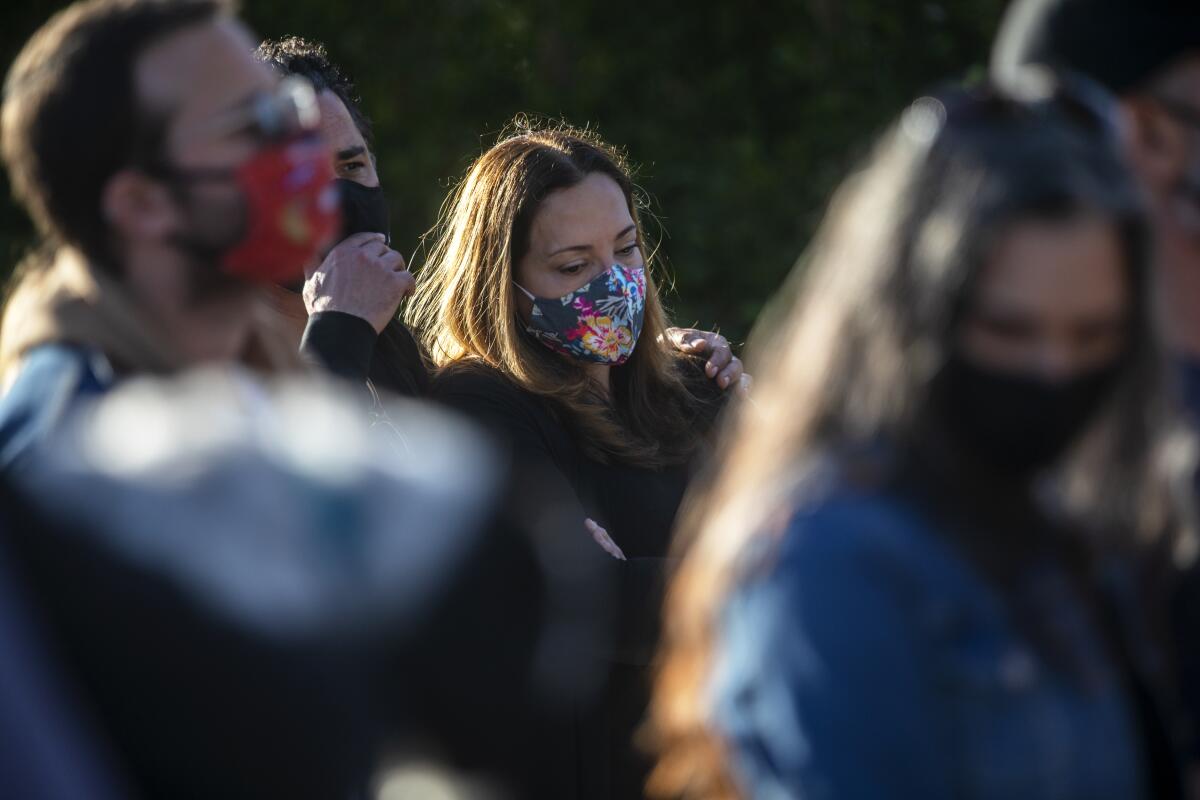
Others in the crowd nodded. Danae Weinberg, 68, held a sign that read, “My neighbor should not have died…. I want my neighborhood back!!!” She later placed the sign on the front gate of City Councilman Paul Koretz’s nearby home as Brill screamed for Koretz to come out.
Koretz did not emerge, but in a letter to constituents he said he is working “very aggressively” with city agencies to “bring homeless residents of the nearby encampment into housing.”
Some in Beverly Grove said they didn’t want to demonize the unhoused people living in their neighborhood or those with mental health issues. They argue city leaders are not doing enough to help those in need of services and treatment, whether it is housing or mental health services.
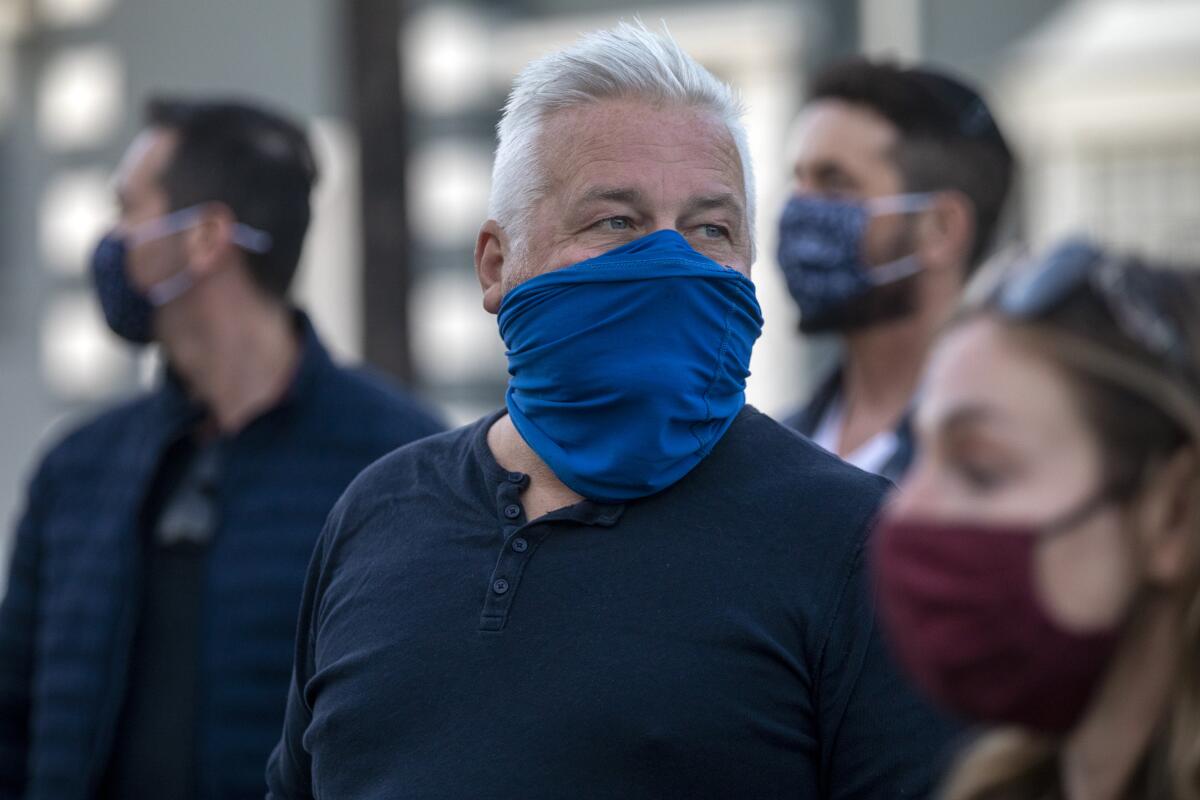
At a time of intense frustration around L.A.’s homelessness and mental illness crisis, in the wake of the controversial clearing of encampments along Echo Park Lake, and amid emerging conversations about how best to handle poverty and homelessness as the city begins to pull out of the COVID-19 pandemic, Donnay’s killing has become a particularly emotional tinderbox.
Those who loved Donnay and lived near him don’t all agree on the path forward, but they all agree that something has to change after his life was stolen so violently — particularly given such a startling series of events preceding the attack.
When the city swiftly fenced off Echo Park and prodded people out of a sprawling camp that had taken root along its scenic lake, it was an extraordinary move in a city full of homeless encampments.
His family members said they want to know why Los Angeles police officers released the suspect, 32-year-old Enoch Conners, after being called to the neighborhood less than two hours before Donnay was killed, for reports that a man was trespassing in neighborhood yards.
“Whoever made that determination that he wasn’t a threat certainly wasn’t right,” said younger brother Theo Donnay.
A ‘curious mind’
There was a moment years ago when Gabriel Donnay’s mother, Yvonne Ottaviano, a physician in Baltimore, talked to him about his future — no doubt bright for the University of Pennsylvania neuroscience major — and suggested he enter an M.D.-PhD program.
“He pretended to kind of go along with that for a while, but then he said, ‘Mom, I don’t really want to be a scientist,’” Ottaviano recalled last week. “‘I would only be discovering things that already exist. I want to do music, because music doesn’t exist until you create it.’”
Donnay’s love of music was overpowering, family, friends and co-workers said. But he was never just one note, and as he grew into adulthood and moved to Los Angeles, he — true to form — found a way to pursue music while also excelling in a science career.
By day, he directed data science for System1, a digital marketing company where his boss called him a “shining light” at the company’s Venice office.
A large cohort of co-workers who attended the Friday memorial recalled him as a generous colleague and brilliant mind who helped the start-up grow.
By night, Donnay created music — including, with some success, with band Satchmode — as a singer, songwriter and multi-instrumentalist who was just as comfortable with classical pieces on the keyboard as he was with tough pop guitar riffs.
He had a sweet voice, perfect for riding the bass lines of the band’s songs, which were pitched on Spotify as “bringing heartbreak to the dance floor.”
Adam Boukis, his longtime bandmate, said Donnay was a creative marvel.
“It was just such an amazing thing to be able to work with Gabe creatively,” Boukis said. “I still think about the melodies he would write all the time, and I’m just in awe of how good they were and how many he wrote and how easily they came out of him.”
Friends from high school in Baltimore and college in Philadelphia all said he was a connector, one of those people who constantly pulled newcomers to L.A. into the fold and made his friends theirs too.
Ottaviano said her son had struggled with depression growing up and into his adult years, and he had come out of it “deeply compassionate” for others with mental illness, including those experiencing homelessness. Even in her grief, she said she wanted to have compassion too. And she wondered: What would her son, with his endlessly “curious mind,” make of his own killing?
A senseless crime
On Monday afternoon, police said, Donnay was at home when he was fatally stabbed by Conners, who was later found in a guesthouse in an adjacent backyard, dead after what police said were self-inflicted knife wounds.
Police had spoken to Conners not long before the attack. Det. Sean Kinchla of the Los Angeles Police Department’s West Bureau homicide unit said officers had been called to the area for a report of a trespasser but had not witnessed Conners trespassing and did not have a resident willing to make a citizen’s arrest — meaning they had no grounds for detaining him.
“The officers have their hands tied. There’s only so much they can do,” Kinchla said. “On one hand, you’ve got to try to help out the person making the call, but on the other hand, the person that is the subject of the call also has rights.”
Conners’ family could not be reached for comment. Kinchla said police have video capturing the attack and confirming that Conners was the assailant. Police said he appeared to be living out of his car.
Brill said that he also had run into Conners in the neighborhood before the attack and that Conners had asked him for directions to a sporting goods store where a large homeless encampment has grown in recent months.
He later walked off as Brill offered him help with his car, which appeared to be broken down in the area, Brill said.
“That must have been when he started jumping everybody’s walls,” he said.
Ottaviano said the family only found out the next day that her son had been killed, after his roommate was released from a long police interview. She said she asked the roommate for every detail of what happened, which he provided.
Donnay had been working in a studio at the rear of the house, having left the back door to the house unlocked so he could come and go, when he came back inside, walked upstairs to his room, realized it was in disarray and then saw Conners there with a knife, his mother said.
“Gabe said, ‘Get out!’ and he started running down the stairs and he was being chased and chased into the backyard,” where he was stabbed repeatedly, Ottaviano said. “Gabe was yelling, ‘Stop! Stop! Stop!’”
The roommate heard the commotion, rushed out and screamed, “Get out of here!” Ottaviano said.
Conners fled, and the roommate cradled her son until he died, his mother said.
Moving forward
At Saturday’s vigil, friends and neighbors clustered in small groups outside the home as a private security guard from the company Post Alarm stood by.
Danielle Peters, 41, grew up in Beverly Grove and has lived in the neighborhood all her life. She said she had already been working to sign neighbors up for the armed private security service when Donnay was killed. Since his killing, interest has increased — and the more neighbors who sign on, the more security patrols there will be.
For most of her life, Peters said, she felt safe in the neighborhood, but lately, she doesn’t go out after dark. She doesn’t know if private security is the answer, but said that she believes the LAPD is too understaffed and that homeless people aren’t getting enough support for the neighborhood to continue without the private watch.
“The majority of people understand there’s a broken system, and you can’t fix one part without fixing all the parts,” she said.
Rolando Calip, 44, stood with his wife and his 3-year-old twin daughters. He said his initial instinct after hearing about Donnay’s killing was to simply get out — to accept the neighborhood would continue going downhill from the “impossible problem” of poverty and crime, and to move his family elsewhere. But after thinking about it some more, after a year indoors and behind masks because of the pandemic, he said he came to a different conclusion.
“I want to know my neighbors more,” he said. “It’s not to hole up and isolate and build up walls. It’s to open up.”
That was always Donnay’s way, too, his friends and family said.
“I hope that we can all just reflect on what an incredible person we have lost, and just keep loving each other and being as open as possible, because that’s how Gabe was,” said Herzog, his girlfriend.
Charlie Dunn said he always admired his friend’s “intellectual genius” and “razor-sharp wit,” but “the thing that I really thought made him a tremendous person was the strength of his character, his moral strength.”
Jacobson said Donnay thought deeply about the plight of L.A.’s homeless population, especially those with untreated mental illness, and cared about finding a solution: “Gabe was so compassionate about that, and felt strongly about that.”
At one point during the memorial, Albert Donnay played a recording over the speaker. It was Gabe from 20 years ago, age 11, singing in his boyish voice a song he’d written himself about missing a departed loved one.
“I still remember you, the way you laughed, the way you cried,” the boy sang. “I hope you know I’m crying, too.”
Times staff writer Lila Seidman contributed to this report.
More to Read
Sign up for Essential California
The most important California stories and recommendations in your inbox every morning.
You may occasionally receive promotional content from the Los Angeles Times.
